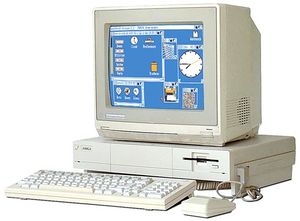Difference between revisions of "Amiga line"
| Line 2: | Line 2: | ||
The later Amigas failed to advance vastly on the old models and the family lost its gain to newer video game consoles and other PC architectures. Eventually, Commodore became bankrupt and production of Amiga hardware and games were on the decline since. Despite this, there are still a handful of loyal Amiga users today and software continues to be developed for the classic machines, as well as a newer line of [https://en.wikipedia.org/wiki/Power_pc PowerPC]-based Amigas released in the 2000s and beyond. | The later Amigas failed to advance vastly on the old models and the family lost its gain to newer video game consoles and other PC architectures. Eventually, Commodore became bankrupt and production of Amiga hardware and games were on the decline since. Despite this, there are still a handful of loyal Amiga users today and software continues to be developed for the classic machines, as well as a newer line of [https://en.wikipedia.org/wiki/Power_pc PowerPC]-based Amigas released in the 2000s and beyond. | ||
| + | |||
| + | The Amiga was a tremendously complex machine, with multiple revisions to both its hardware and its system software. This can make emulation quite tricky, as figuring out the requirements for any specific game can be fairly difficult. | ||
==Emulators== | ==Emulators== | ||
Revision as of 16:50, 6 December 2015
The Amiga is a series of computers released by Commodore, starting in 1985. It was a very powerful and capable machine for its time, featuring a Motorola 68000 and custom chips dedicated to IO, sound, graphics and more. This family of computers became quite popular, especially in Europe, spawning a huge library of games over time.
The later Amigas failed to advance vastly on the old models and the family lost its gain to newer video game consoles and other PC architectures. Eventually, Commodore became bankrupt and production of Amiga hardware and games were on the decline since. Despite this, there are still a handful of loyal Amiga users today and software continues to be developed for the classic machines, as well as a newer line of PowerPC-based Amigas released in the 2000s and beyond.
The Amiga was a tremendously complex machine, with multiple revisions to both its hardware and its system software. This can make emulation quite tricky, as figuring out the requirements for any specific game can be fairly difficult.
Emulators
| Name | Operating System(s) | Latest Version | Active | Libretro Core | Recommended |
|---|---|---|---|---|---|
| WinUAE | Windows | 3.1.0 | ✓ | ✗ | ✓ |
| FS-UAE | Multi-platform | 2.4.1 | ✓ | ✗ | ✓ |
